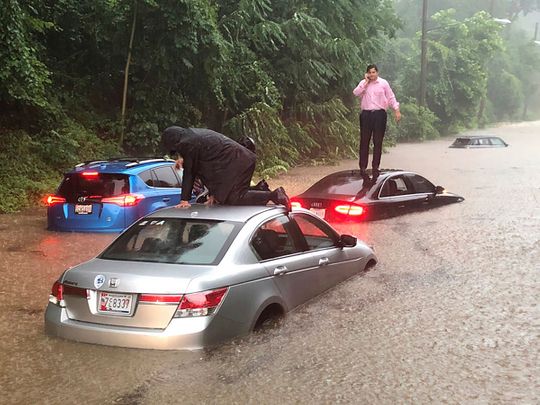
WASHINGTON: Cars floated away on rivers of brown water. Roadways were washed out, and backyards turned into lakes in seconds.
Motorists clambered onto the roofs of their stranded cars, drenched in the relentless downpour. Major thoroughfares vanished beneath muddy torrents, and a newly refurbished Little League baseball field was wrecked by water from an overflowing creek.
The rain came after a glowering, humid morning, amid warnings of flash floods, and then fell in grey sheets so thick it was hard to see and so loud it was hard to hear.
It was an epic rainstorm that drenched the Washington area Monday. And water, which had no place to go, went where it would.
It gathered force and crashed through roadway retaining walls. It gushed through the ceiling of a Metro station, showering passing rail cars. It crept into the basement of the National Archives, which had to be closed down.
It carried away tree stumps and garbage. It was a month’s worth of rain in a single hour, according to Jason Samenow of The Washington Post’s Capital Weather Gang.
The inner loop of the Beltway was shut for a time. The rain even got into the White House.
Washington-area residents were still recovering from the deluge late in a day that showed the fearful power of nature, hobbled transportation and led to extensive power outages.
Heavy as the rain was, no one was reported killed or injured.
Waters had receded in most places by the afternoon, and waterlogged cars had been towed to safety.
But many residents had hair-raising tales of flight from the sudden torrents, climbing through a car’s sunroof to escape rising water, and of having a car begin to float as they sat in it.
In Washington, parts of several roads and a highway ramp were closed during Monday’s afternoon commute. Commuter trains in Virginia and Maryland faced delays.
Floodwater hit the power vault of the National Archives, causing the building to close. It will remain closed on Tuesday. Archives officials said its holdings, including the Declaration of Independence, the Constitution and the Bill of Rights, were safe.
Metro, too, was struggling to deal with the deluge. While no stations closed and no rail lines were suspended because of flooding, there were reports of weather-related outages and heavy water flowing into a station ceiling and several rail cars.
Utility officials said crews had restored power to thousands of homes, but by 1pm, 3,300 customers were without power, down from at least 10,000 in the region since the storms started early Monday.
In some areas, utility crews were encountering water levels so high that they couldn’t access affected locations.
Dominion Energy spokesman Jeremy Slayton said the hardest-hit areas in Virginia included Alexandria, Springfield and Herndon, where the utility was having problems with downed trees on power lines and flooding. At its peak, 7,000 Dominion customers were without power, he said.
In the McLean area, Dominion workers unable to access a community because of high water were trying to find another route, a utility spokesman said. He said in some areas, crews needed to wait until the water receded.
Residents in the Woodrock neighbourhood in Potomac, Maryland, were left stranded by a gaping sinkhole caused by the floods. A temporary patch had been put in place on Monday night, but a full repair could take weeks.
The morning commute had been a nightmare.
The inner loop of the Beltway was temporarily closed at the American Legion Bridge. Amtrak service was interrupted.
Pedestrians got soaked — by the rain and the rooster-tails caused by speeding motorists.
A man in Washington, William Digges, 21, of Bethesda, Maryland, was photographed standing in the downpour on the roof of his flooded Audi.
He said that he stopped because it seemed unsafe to proceed through the river of water that had suddenly covered the road, and that he could not turn back because he feared the inbound traffic flow behind him. “I see, literally, a Mini Cooper floating in the water,” he said. “I think, ‘OK, I should stop here.’”
He called his father, Ed, to ask what he should do. His father, thinking it was a joke, told him that if water was coming into the car, to roll up his windows.
Ed Digges quickly realised it was no joke. As the water rose in his car, William Digges crouched on the driver’s seat, then opened the sunroof. He grabbed his phone, his wallet and passport and squeezed out onto the roof. He stood there in a sopping pink dress shirt and tried to call his father again. But now the phone wouldn’t work.
He looked into the car, and the water was above the gear shift. “I was worried that the car would be swept away and I would fall off the roof,” and be swept down the road, he said. “It was a wave of water coming out of nowhere.”
He said a quick prayer: “Please get me out of here.”
Harry Tun, a lawyer from Potomac, was nearby. He had been heading to a court hearing in the District of Columbia when his car was slammed by the torrent.
His Mercedes stopped. Tun said he attempted to restart it, but the engine was dead. The water kept rising.
It reached almost to the door handle. He rolled down his window just in case he had to make an escape.
An inch of water seeped into his vehicle.
Then the car began to float, drifting back 4 or 5 feet, he said. Terrified, he called 911.
Also nearby was John Butler, headed to his government job in DC from his home in Bethesda.
Much of the drive, he said, was fine, although it was raining heavily. But there had been no flooding.
Then around 8.45am, it got bad, fast.
Butler said he managed to get out of his vehicle and stood on the frame outside the driver’s side door with an umbrella over his head.
“I was freaking out,” Butler said. “I was very very scared.
“In about three minutes, it went from water covering the soles of my shoes to where I’m standing on the frame of my car because it was so high that if I stepped down it was going to be above my knees,” Butler said.
He shouted to other drivers, “You need to back up!” He said people started to do three-point turns to turn around and back up from the flooded road.
And just as fast as it started, he said, within 10 minutes, it was over and the water started to subside.
Between 9 and 11am, Reagan National Airport got 86.6mm of rain, the rough equivalent of about 762mm of snow.
In Arlington, Virginia, 114.3mm fell, according to meteorologist Cody Ledbetter of the National Weather Service.
More than 127mm fell in North Potomac, Maryland, and there was a report of 127mm in the Frederick area, Ledbetter said.
The weather was expected to be sunny, warm and dry Tuesday and Wednesday, providing a respite from the stormy and humid conditions of recent days.












